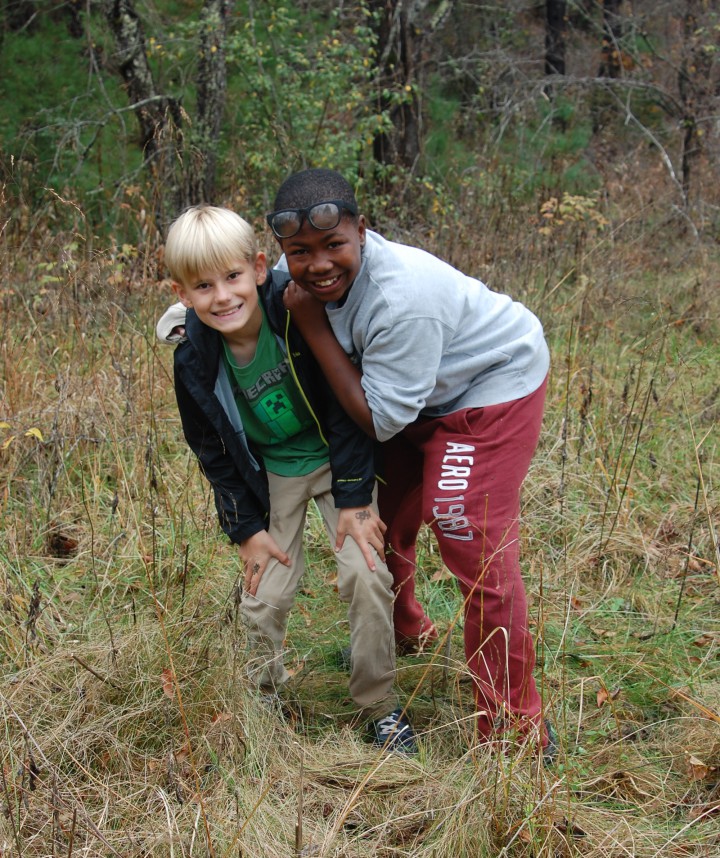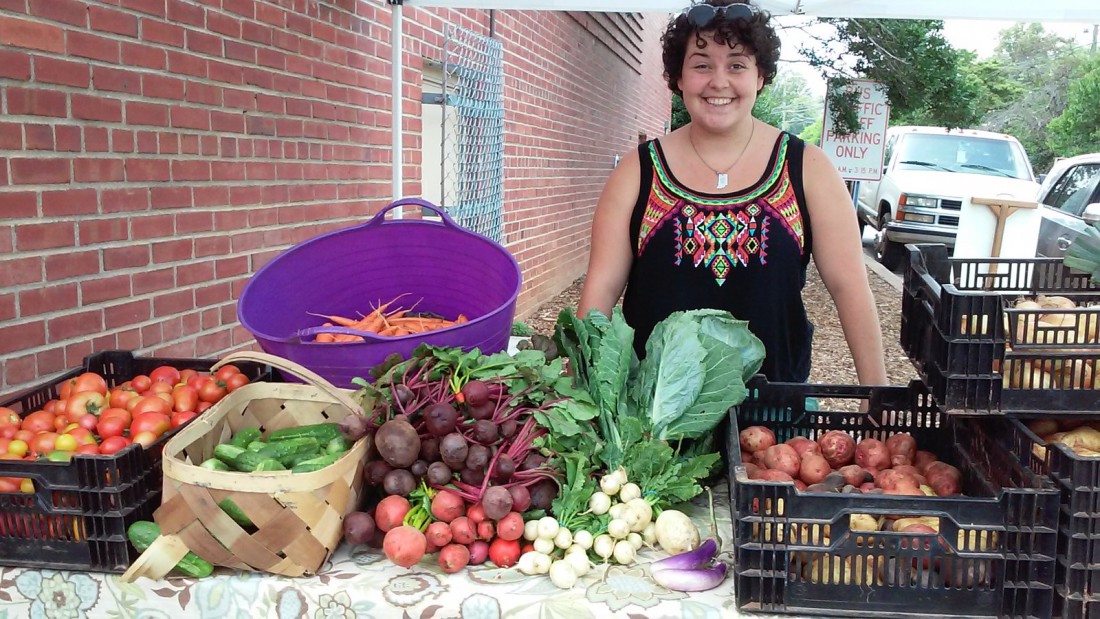Heading up a local nonprofit is hard, whether it’s a shoestring operation or a large, well-established organization. For the leaders of Western North Carolina’s diverse array of charitable enterprises, pursuing their respective groups’ missions can entail everything from executive decision-making to grant writing to janitorial duties. Backed by a community of eager volunteers and donors, however, these determined, passionate individuals are addressing key issues while enhancing the quality of life in the region.
Strength in numbers
Loving Food Resources provides food to people in 18 WNC counties who are living with HIV/AIDS or are in home-based hospice care for any reason. In 2015, more than 150 volunteers helped the Asheville-based nonprofit distribute more than 100 tons of food. Before hiring Nancy Gavin as its first full-time executive director last year, the organization had been all-volunteer since its inception in 1991.
Long-term volunteers, she says, are the reason the nonprofit has prospered. “We have a volunteer who makes sure routine cleaning and maintenance is performed on our refrigerators and freezers, volunteers who manage our community garden that provides fresh produce to the pantry, volunteers who staff the office and take care of administrative duties, volunteers who drive our box truck for our MANNA FoodBank pickup, and volunteers who shop on the floor of MANNA.”
The Lord’s Acre, based in Fairview, also makes the most of a skeleton crew consisting of one full-time and one part-time employee. Executive Director Susan Sides says her organization feeds those in need while educating the public on how to grow food for themselves and/or to share. With the help of some 600 volunteers, the nonprofit donates about 11 tons of organic food annually. Sides says the community has rallied around The Lord’s Acre, and the group hasn’t generally had much trouble maintaining a volunteer base.
Some local organizations are completely volunteer-driven. The POP Project, founded in 2009, distributes used books to schools, churches, correctional systems, homeless shelters and other facilities throughout Western North Carolina. Last year alone, the Asheville-based nonprofit donated more than 7,500 books worth an estimated $38,000, says Sarah Giavedoni, director of donations and volunteers.
“The POP Project is built on the hard work of a handful of long-term volunteers, our wonderful board and several dozen short-term volunteers throughout the year,” she explains.
Brother Wolf Animal Rescue, based in Asheville, relies on a roster of more than 2,500 volunteers. Founder Denise Bitz says the first full-time hire she made was a volunteer coordinator; she now has about 52 full- and part-time employees. And to keep up with the flow of volunteers, they’re now holding two orientations per week.
“I think people come to Asheville because they love that people living here care about quality of life — for people and for animals. Volunteering and giving back is a great way for people to have a great quality of life.”
The Asheville Downtown Association works to support downtown businesses while promoting a vibrant city center. That includes producing the Downtown After 5 concert series, the Independence Day celebration and the Asheville holiday parade. To pull off projects on that scale, the ADA needs a backbone of solid volunteer support.
Executive Director Meghan Rogers, one of two full-time employees, says they call on about 350 volunteers. But despite having a reliable core group, enlisting enough willing hands to adequately staff those happenings can be difficult. “One challenge for us is that our events occur on weekends and holidays, when many people have other plans. We also struggle to fill our second shifts, since many people like to get their volunteer service in early, then enjoy the rest of the event. We do our best to make sure our volunteers know they’re appreciated: Our perks program includes event T-shirts, beverage tokens and a great party.”

Many hats
When Ryan Olson became executive director of the Brevard-based Muddy Sneakers, his support staff consisted of one part-timer. The nonprofit, which promotes experiential and wilderness education, works with six school systems, serving about 1,600 kids each year.
In the early days, notes Olson, he wore a variety of hats, including working on IT issues, developing programs, building human resource protocols and addressing other needs that there was no one else to take care of. Today, Muddy Sneakers has four 30-plus-hour employees, allowing Olson to focus more on things like partner relations, community outreach and grant writing.
“As an executive director of a small nonprofit, you constantly have to be prepared to get pulled into anything. And the more dynamic you are, the more diverse your background, the better you’ll be served,” he observes.
The N.C. Stage Company aims to bring professional-quality theater productions to Western North Carolina. Founded in 2001, the nonprofit now has three full-time and three part-time employees, with a supporting cast that varies depending on the play. Co-founder and Artistic Director Charlie Flynn-McIver says he makes “a lot of the artistic decisions, hiring of all the people that design, act, direct. Day-to-day, I’m doing a lot of fundraiser letters, outreach, glad-handing with donors, picking [actors] up from the airport, taking them to housing that I hunted down, and brokering agreements with vendors to get breaks on prices in exchange for advertising.”
Gavin, too, says that despite Loving Food Resources’ committed volunteers, she sometimes has to step up and do whatever’s necessary. “If a volunteer hasn’t taken care of cleaning the waiting area and bathrooms, I am certainly not above cleaning responsibilities. I also process intake forms for new clients, call to give them directions to the pantry and answer any questions they may have,” she says.
And while Gavin loves working with the organization’s more than 150 volunteers, her many other responsibilities sometimes leave her feeling that “I’m not giving them the attention they deserve, and I’m not taking enough time to groom certain volunteers into taking leadership roles.”
Sides’ duties at The Lord’s Acre also run the gamut, including “growing food, managing volunteers and interns, stuffing envelopes, helping with fundraisers, photography, social media, community engagement, attending board meetings, writing grants, attending conferences, strategic planning, personal education, writing thank-you notes.”
And though Bitz presides over a fully staffed nonprofit, she says she still cleans up poop and takes animals to veterinarian appointments. Her primary focus, though, is “making sure Brother Wolf is living up to its mission — and, basically, raising the money so we can operate.”

The M-word
But if these nonprofit leaders are driven by passion, money is essential to keeping their organizations going. “The majority of my time is expected to be spent on fundraising: establishing relationships with current and potential donors, seeking out and applying for grants, organizing fundraisers,” says Gavin. “Seeking new funding sources is an ongoing need for any nonprofit; it can be very time-consuming and challenging, yet rewarding.”
For that reason, Brother Wolf looks beyond traditional approaches, operating two thrift stores, a grooming service and a retail store. Bitz says she’s “always looking for new ways to generate revenue that doesn’t involve asking people directly for money,” though she still does that as well. “There are limited resources, and there are a great many wonderful nonprofits doing wonderful work. I don’t really see us in competition with anybody, because I think a lot of donors have multiple causes that are near and dear to them.”
Olson says he’s constantly thinking of ways to present Muddy Sneakers as an investment, not a charity. He also believes in reaching out to like-minded organizations. “Nonprofits, historically, haven’t collaborated because of a fear of sharing their donor lists,” he notes. “We’re trying to broaden our partnerships. Donors want to see collaboration, and they believe organizations will be stronger partnering to get bigger projects done than working in silos.”
As an all-volunteer organization with a roughly $3,500 annual budget, The POP Project is keenly aware of financial issues. Giavedoni says Asheville is an amazingly supportive community, but “there are so many nonprofits in the area with voices of varying strengths. It’s difficult for small organizations like ours to secure support for our services while competing with larger, staffed organizations whose causes are just as important.” Most of POP’s overhead, she says, involves book storage. “Our dream is to find someone who can donate space in exchange for the tax benefits of working with a nonprofit.”
Sides sees the money hunt as involving more than just financial assets. “Fundraising is not simply asking for money or creating events — it’s also finding community assets and putting them to use, making new friends, building relationships, extending heartfelt thanks and loving folks,” she points out. Still, it’s “challenging, both practically and in the toll it takes on the personal energy of all involved. There is never a time we’re not thinking about or working on it.”
Asheville’s relatively small size also limits fundraising possibilities. Flynn-McIver says his theater peers in other cities “have a local place where they can write a competitive grant for operating expenses. We really have nothing like that here, and all my colleagues across the state are stupefied when they hear that.”
Rogers sounds a similar note. “There are a lot of nonprofits in the Asheville area, and we’re often competing for the same donors or sponsors. That, coupled with the fact that Asheville doesn’t have a lot of major corporations, makes fundraising challenging. For the ADA, fundraising is primarily centered on event sponsorship, though we’re looking at ways to increase our nonevent income.”

The payoff
But amid the endless herding of volunteers, juggling of duties and chasing after dollars, what keeps these local leaders going?
“The most rewarding thing for me,” says Bitz, “is that we’re in the business of social change, and I’ve seen it happen right before my eyes.”
Giavedoni acknowledges that The POP Project has faced challenges in its efforts to deliver books to prisons. Navigating the bureaucracy can be difficult, she says, and each institution has its own rules and restrictions. “We have learned over the years that prisons are certainly not a service industry. Yet, despite any small hurdles we hit, our passion for the mission keeps us moving forward.”
Gavin, too, says seeing her organization’s mission come to life is a great way to stay grounded and recharge. “The reward is in the smiles of the people we see on Saturdays when they come to shop. They’re grateful for the service we provide, and that makes it all worthwhile.”
Sides says The Lord’s Acre crew is enjoying the journey as much as fulfilling the mission. “No one on our board knew the first thing about nonprofit work when we began, and that’s been our challenge and our strength. What started simply as a way to provide fresh produce to our local pantry has become a way of bringing people together around food.”
For Flynn-McIver, part of the payoff is seeing the community support unorthodox arts projects — and watching them come to life. “We do more challenging things than some other theaters in town, and do it at a level that professional actors appreciate. … It’s a hard ticket to sell, but it’s very rewarding.”
Rogers says she finds satisfaction in “working with volunteers to put together free, fun events for the citizens of Asheville. Also, seeing a project or program we’ve partnered on come to fruition in a way that makes downtown better for members, businesses, residents and visitors.”
For Olson, the obvious answer is seeing kids learn about the region’s wilderness resources. But beyond that, he maintains, working in WNC’s nonprofit sector is its own reward. “If someone reading this article is thinking about getting into the nonprofit world, or sticking around to get to the executive level, I would encourage them to do so. Having worked in the for-profit sector, I realize just how lucky we are to have so many highly educated, invested folks that do care about quality of life.”






Before you comment
The comments section is here to provide a platform for civil dialogue on the issues we face together as a local community. Xpress is committed to offering this platform for all voices, but when the tone of the discussion gets nasty or strays off topic, we believe many people choose not to participate. Xpress editors are determined to moderate comments to ensure a constructive interchange is maintained. All comments judged not to be in keeping with the spirit of civil discourse will be removed and repeat violators will be banned. See here for our terms of service. Thank you for being part of this effort to promote respectful discussion.